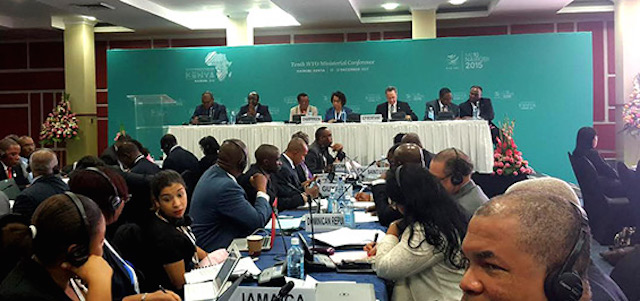By INPS* | IDN-InDepthNews Report
NAIROBI (IDN) – Trade ministers of African, Caribbean and Pacific (ACP) group of countries have emphasized the importance of securing a development centred outcome at the Tenth Ministerial Conference (MC10) of the World Trade Organization (WTO).
This is the first ever WTO conference to be held in Africa – from December 15 to 18, 2015 in Kenya’s capital Nairobi. At a strategic preparatory meeting a day ahead of the conference, WTO members of the 79-nation ACP Group reaffirmed their declaration on the WTO 10th Ministerial Conference, which was previously endorsed in October by trade ministers meeting in Brussels.
In keeping with their commitment to a rules based multilateral trading system, they stressed at a strategic preparatory meeting the necessity for a clear commitment in Nairobi to concluding all unresolved issues in the Doha Development Agenda (DDA) on the development mandate with a view to yielding specific development milestones in the post-Nairobi phase.
They urged all Members to show the required political will to achieve consensus in all remaining areas of the DDA.
Amongst the 15 development decisions proposed in the ACP declaration include ministerial affirmation on:
– Flexibilities for Least Developed Countries (LDCs) and Small and Vulnerable Economies (SVEs) in agriculture and non-agriculture goods;
– Agreed flexibilities for developing countries in service negotiations; and different tariff reduction targets to be defined for developed countries, developing countries, and SVEs in accordance with the principles of special differentiated treatment and less than full reciprocity. LDCs shall be exempt from making tariff reductions.
The declaration also called for concrete and binding decisions on cotton, as well as in the areas put forward by LDCs, and specific proposals submitted by the G90 countries.
Fisheries remain an important issue, and the Group was seeking convergence during the meeting on how to move forward on it.
They stressed the importance of ensuring that the negotiations post-Nairobi respect the principles of fairness, inclusiveness and transparency and take into account the positions of the ACP Group of States in areas such as agriculture, services, NAMA, rules, including fisheries, and Trade-Related Intellectual Property Rights negotiations, contained in the ACP Declaration.
Chair and spokesperson of the ACP Group for MC10, Maxine McClean, Minister of Foreign Affairs & Foreign Trade of Barbados highlighted in an opening statement a number of unresolved issues which would need to be addressed within the coming days, including agriculture, flexibility issues, special and differential treatment in trade, and the continuation of the Doha Development Agenda.
ACP Secretary General Dr. Patrick Gomes, Coordinator of the ACP Group in Geneva Ambassador Marion Williams, and a representative of Kenyan Cabinet Secretary for Foreign Affairs and International Trade Ambassador Amina Mohamed also delivered introductory statements.
In an opening statement to the MC10 on December 15, Amina C. Mohamed, Cabinet Secretary and Chairperson of the Tenth Session of the Ministerial Conference said: “Africa holds significant potential, including for investment, growth and development. Yet, many of our economies still face severe supply-side, institutional and structural constraints that hinder our ability to harness this potential.”
Africa can and must overcome these challenges to fully optimize its potential. An open, rules-based, non-discriminatory, multilateral trading system, as embodied in the WTO, can respond to these challenges and support Africa’s efforts towards fostering economic growth and development, she added.
Secretary General of the United Nations Centre for Trade and Development (UNCTAD) Mukhisa Kituyi made a presentation on the context in which the ACP countries had to negotiate, highlighting several key challenges to monitor closely.
The global decline of trade growth has seen the global GDP grow faster than trade since the financial crisis in 2008. If the trend continues, by 2020 global trade growth would be much slower than any time in history since the Second World War, Kituyi said.
The rise of the mega-plurilateral agreements such as the Trans-Atlantic and Trans-Pacific schemes may also threaten the gains made by developing countries under the multilateral trading system (MTS), for example on market access. Despite the slow progress of the multilateral process, ACP countries are concerned that concluding an outcome should not be forced at the expense of a balanced deal.
While higher cost of labour in the industrialised countries creates new markets for others, this model could be affected by the exponential growth of artificial intelligence and robotics in the industrial North, gradually taking over many labour-intensive jobs.
Kituyi added that the global development agenda towards 2030 was also a key element to consider. With the unfinished business of the Millennium Development Goals (MDGs) still to be resolved, a central question is how to deal with raised ambitions with reduced resource ‘additionality’ following various crises around the world affecting development finance.
*INPS is an acronym for the International Press Syndicate that monitors diverse news and information sources around the world, enabling IDN offer news, features and analyses on topics that impact the world and its peoples. [IDN-InDepthNews – 16 December 2015]
Photo: Preparatory meeting of ACP Trade Ministers before the 10th Ministerial Conference of the WTO in Nairobi, Kenya. Credit: ACP
2015 IDN-InDepthNews | Analysis That Matters
Send your comment | Subscribe to IDN newsletter
Follow us on Twitter and Facebook:
http://twitter.com/InDepthNews
http://www.facebook.com/IDN.GoingDeeper

